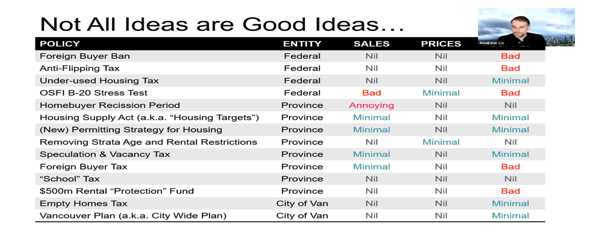When the market was over heated (Demand much greater than Supply) – prior to spring 2022 – prices were crazy and buyers were stressed. So our federal government decided they had to do something. Casting foreign buyers (2% of all buyers in Canada / 3.3% in B.C.) as the scapegoats responsible for driving real estate prices to dizzying heights, the government decided they had to do something.
When the market was cooling down, as a result of a massive increase in interest rates- driven by inflation, the Feds decided now was the time to unveil The Prohibition on the Purchase of Residential Property by Non- Canadians Act .
This Act was passed in June 2022 but the details were not released until late December 2022 and came into force January 1, 2023 – less than 2 weeks later.
Now just 2 months old, this new Regulation is, unsurprisingly, already causing problems.
Benjamin Tal – economist at CIBC says “The language used in the Act is causing issues, and it’s stopping real estate development — necessary to boost housing supply and address affordability — in its tracks. The language of the Act appears straightforward until you show it to a lawyer,”
Where it applies:
Municipalities with a core population of more than 10,000 in a census agglomeration or census metropolitan area. Here is a 2021 list of municipalities considered a “census agglomeration or census metropolitan area; (Note: Vancouver CMA = the Lower Mainland which covers Horseshow Bay to Hope.)
932. Abbotsford – Mission, CMA/RMR 944. Campbell River, CA/AR 930. Chilliwack, CMA/RMR 943. Courtenay, CA/AR 905. Cranbrook, CA/AR 975. Dawson Creek, CA/AR 937. Duncan, CA/AR 977. Fort St. John, CA/AR 925. Kamloops, CMA/RMR 936. Ladysmith, CA/AR 915. Kelowna, CMA/RMR 938. Nanaimo, CMA/RMR 907. Nelson, CA/AR 939. Parksville, CA/AR 913. Penticton, CA/AR 940. Port Alberni, CA/AR 945. Powell River, CA/AR 970. Prince George, CA/AR 955. Prince Rupert, CA/AR 952. Quesnel, CA/AR 920. Salmon Arm, CA/AR 934. Squamish, CA/AR 965. Terrace, CA/AR 910. Trail, CA/AR 933. Vancouver, CMA/RMR 918. Vernon, CA/AR 935. Victoria, CMA/RMR 950. Williams Lake, CA/AR
What it applies to:
- Residential property.
That term legally captures far more property types than lawmakers likely intended. While homes such as detached, semi-detached, row houses and condominiums fall under that category, so does land. Vacant or developed land that doesn’t house a habitable structure, is zoned for residential or mixed use, and located within a metropolitan area, is included under that definition. As a result, any commercial property in such a zone would be banned from being owned by a non-Canadian.
“The entire area of downtown Toronto falls under that category,” Tal said.
Who it applies to
- The Act prohibits non-Canadians from purchasing residential property, directly or indirectly.
- Canadian corporations which are controlled by a foreign person or corporation, such as a foreign parent company, are considered non-Canadians and are therefore prohibited from purchasing residential property. Where “control” is defined as more than 3% ownership.
- Further, the definition of “non-Canadian” is also a source of problems. Corporations are considered non-Canadian under the Act if they have foreign ownership of at least three percent. Although the Act excludes companies listed on a Canadian stock exchange from being affected, it fails to exclude real estate investment trusts (REITs) — important builders of residential property such as apartments. That means most publicly traded Canadian REITS are therefore considered “foreign entities,” the note said. As a result, many REITs risk being blocked from building much-needed new housing.
- Even the word “purchase” has issues. Because the term includes direct and indirect purchases, the Act effectively bans foreigners from acquiring leases or mortgages on residential dwellings. Buying shares is also included, meaning non-Canadians could be blocked from investing in units of a REIT that owns residential assets.
Exceptions:
Section 4(2) of the Regulations stipulates that a purchase does not include:
- acquisition by an individual of an interest or a real right resulting from death, divorce, separation or a gift;
- rental of a dwelling unit to a tenant for the purpose of its occupation by the tenant; This has been said to cover foreign buyers buying a rental property to rent out.
- transfer under the terms of a trust that was created prior to the Act coming into force; or
- transfer resulting from the exercise of a security interest or secured right by a secured creditor.
- will not apply to refugees, temporary residents, protected persons under the Immigration and Refugee Protection Act, foreign diplomats and other groupsas stated in the Act and Regulations.11
- Residential properties in municipalities with a core population of less than 10,000 arenot subject to the ban,
- nor are recreational properties such as cottages and lake houses.
- Additionally, the law does not explicitly ban the purchase of larger buildings with multiple units.
- The end result has brought upheaval to the real estate industry and caused even commercial deals, with no ties to residential homes, to be cancelled or held back
- “The damage is real,” Tal said. “Developers that are partly foreign owned or rely on foreign equity cannot proceed with purpose built developments that, in our view, are the most effective tool to tackle Canada’s housing affordability crisis.”
- The implications could even stretch beyond the real estate industry, he warned. For example, companies with a minority non-Canadian investor could be blocked from buying shares in a company that happens to reside on land zoned for mixed or residential use.
Echoed by Kevin Lee, CEO of the Canadian Home Builders’ Association
“The legislation has instead affected the production of thousands and thousands and thousands of units”
Hundreds of commercial deals have been cancelled as any company with a miniscule amount of foreign ownership are now banned. Typically, developers tend to seek funds from a variety of sources outside of domestic sources.
- A U.S. Congressman from New York, said he believes the new ban violates Canada’s trade agreement with the U.S. and Mexico, as well as long-standing tax treaties.
- Major educational institutions and leading-edge tech firms are saying its negatively impacting their ability to recruit top talent to come to Canada.
- The Canadian Home Builders’ Association is calling on the federal government to change regulations immediately to prevent a collapse of the new housing supply.
- And then there is the government’s own immigration plan to welcome 465,000 newcomers to Canada this year alone. Typically 15% of those settle in BC. We are already lacking sufficient housing for newcomers & now there is going to a major shortfall.
- “The way that the legislation was written, it has the potential to adversely affect commercial real estate transactions, as well as foreign investment into Canada,” Kassian said in an interview with Yahoo Finance Canada. For example, the Act could theoretically prohibit a Canadian subsidiary of a U.S. energy company from acquiring farm land to construct a new refinery if the land is located within an official census metropolitan area, Kassian and Cragg noted in a report about the legislation.
The result? The ban is having just the opposite effect as originally intended and is putting pressure on real estate prices to increase even further.
“It’s created uncertainty in the industry right now.”
Here are just a few other examples of Government ineffectual meddling (the last column is “Supply”).

A couple of fitting historical quotes;
Milton Friedman – The government solution to a problem is usually as bad as the problem
Groucho Marx – Politics is the art of looking for trouble, finding it everywhere, diagnosing it incorrectly and applying the wrong remedies.


